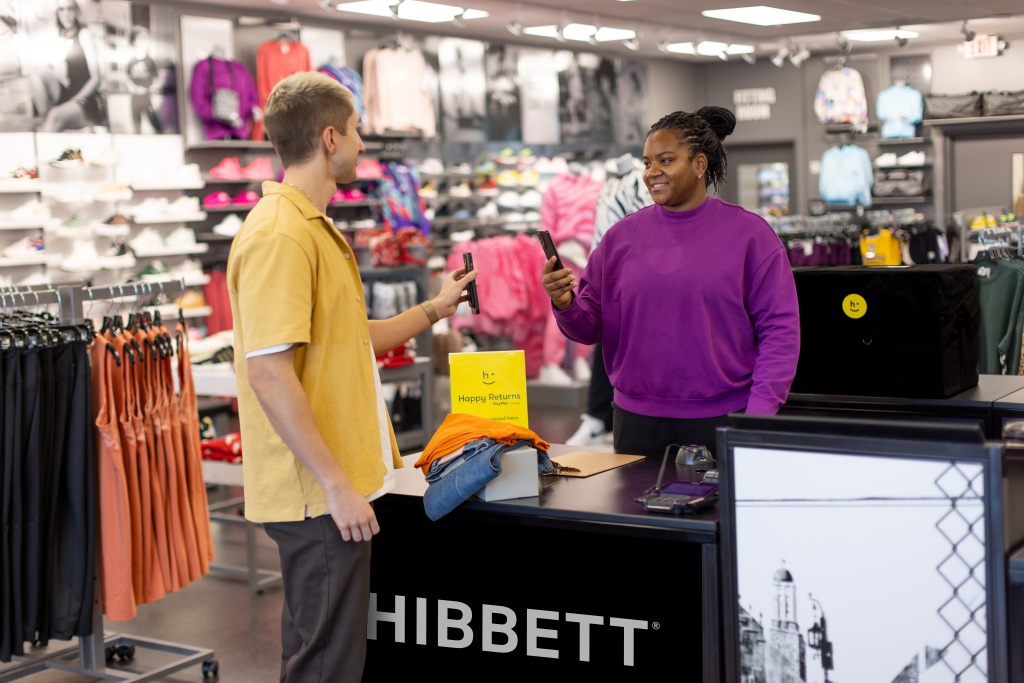The weekly Retail Tech Roundup compiles technology news across the supply chain, manufacturing, retail, e-commerce, logistics and fulfillment sectors.
Returns
Hibbett/Happy Returns
Happy Returns’ Return Bars are now inside more than 1,100 Hibbett Sports and City Gear specialty stores nationwide.
Online shoppers can use the Return Bars to make returns from hundreds of digital retailers in-person, box-free and label-free at Hibbett and City Gear stores in 36 states.
“Innovation is a key operating principle for Hibbett as we continuously look for ways to improve the shopper experience and adapt to ever-changing consumer needs and wants,” said Ben Knighten, senior vice president, store operations, Hibbett, Inc. in a statement. “We are helping expand the Happy Returns network with the added convenience of more than 1,100 new Return Bars and introducing Happy Returns shoppers to the best-in-class Hibbett and City Gear customer experience.”
Installing the Return Bars could help Hibbett attract millions of new customers. The deal will help reduce cardboard waste through the use of reusable containers and help lower greenhouse gas emissions compared to returns by mail.
To use Happy Returns, online shoppers retrieve a QR code from the website where they purchased their item. The shopper then brings the return item and QR code to one of 1,100 Hibbett or City Gear locations near them and stops by the checkout counter to drop it off, for an immediate refund and an emailed coupon to use in store once the return is completed.
The partnership expands Happy’s footprint to over 6,000 Return Bars, which means 78 percent of U.S. households are within a 10-mile drive of a Happy Returns drop off location, according to David Sobie, vice president of Happy Returns.
BOPIS
BigCommerce has introduced its own buy online, pick up in store (BOPIS) feature inside its Open SaaS e-commerce platform.
In the United States, BOPIS is projected to continue growing about 10 percent per year and surpass $131 billion in 2026, according to eMarketer. The growth rate is similar in the U.K., where the service known as “click and collect” is on track to exceed $40 billion in 2026.
BigCommerce’s BOPIS offering includes new and updated APIs that provide merchants with the tools to create custom BOPIS/click and collect experiences tailored to their buyers’ preferences and integrated into their overall strategy for order fulfillment. BOPIS is now available as a multi-location inventory functionality to enterprise merchants.
This release features a set of new APIs, including a new Inventory API to manage inventory across locations and a new Pickup Methods API to create and manage pickup methods per location.
Additionally, the e-commerce technology platform has updated some of its current APIs including Checkout SDK, Checkout S2S API, Storefront GraphQL, Orders API and Catalog API updated to support BOPIS.
Supply chain
Alex and Ani/Stord
Alex and Ani, an accessories and jewelry retailer and producer, has partnered with cloud-based supply chain company Stord to accelerate e-commerce, retail and B2B growth, reduce costs, improve efficiency and enhance the customer experience.
After handling distribution, fulfillment and manufacturing in-house since its inception, Alex and Ani recognized the need to outsource its warehousing and fulfillment. It was looking for a solution built to scale that combines physical warehousing and fulfillment with an end-to-end order management (OMS) platform. Stord’s software allows Alex and Ani to access real-time data and make more informed decisions, which can lead to seamless optimization and scaling of operations that can improve the customer experience.
As its customer base continues to grow, Alex and Ani aims to implement faster delivery times and lower costs. By moving its inventory into Stord’s nationwide network of warehouses, the company wants to reduce delivery times and distances while improving customer expectations. In addition, Stord Parcel, a carrier-agnostic last-mile delivery solution, lets Alex and Ani automatically select an efficient and cost-effective carrier and service level for each package, with advanced modeling to ensure expected delivery dates are met.
“Our e-commerce business has rapidly grown, and we wanted a partner with expertise across our supply chain that delivers a high quality experience for our customers,” said Scott Burger, Alex and Ani CEO. “Trusting Stord with DTC and B2B fulfillment allows our team to focus on scaling our brand, developing products, and further elevating the customer experience.”
This news comes on the heels of continued platform momentum for Stord, which launched Stord Parcel, Stord One Commerce, as well as a port-to-porch logistics offering last year. The company laid off 59 employees, or 8 percent of its workforce, a month after landing a $120 million investment last May.
3D fashion
Unifi3D/BeProduct
Unifi3d, the 3D-as-a-service technology provider created by Li & Fung’s incubator LFX, is joining forces with BeProduct, a digital product platform (DPP) solutions provider, to create a streamlined digital product creation and lifestyle management process for major brands, retailers and manufacturers.
As digital fashion and digital asset management continue to rapidly evolve, Unifi3d will combine its expertise in manufacturing know-how and 3D digital product creation with BeProduct’s interoperable digital product platform. The result will be an enhanced platform designed to manage all digital assets, workflows, processes and facilitate collaboration and creation between designers, vendors, manufacturers and buyers in real-time.
Since 2016, Unifi3d has been helping brand owners transition to the digital product creation space. By accelerating the creation and sale of digital products at scale, Unifi3d says it has helped brands and retailers cut production lead times, costs and raw material waste. Meanwhile BeProduct is a cloud-based centralized platform bringing the essential parts of the product creation process into one space, allowing designers, buyers and merchandisers to collaborate anywhere, anytime.
By combining Unifi3d’s expertise and BeProduct’s platform, the companies also aim to offer brands and retailers solutions that will bring products to market faster, with greater efficiency and lower costs. This partnership aims to increase collaboration, ultimately driving sustainability outcomes for the fashion industry.
Hexa
Hexa, a 3D asset visualization and management platform, has raised a $20.5 million Series A round from Point72 Ventures, Samurai Incubate, Sarona Partners and HTC.
The company’s proprietary tech stack is designed to digitize products like furniture and fashion using existing 2D images and AI, creating a new 3D model, a digital twin of the physical object. This digital twin can then be deployed on websites, social media and in augmented reality (AR) applications.
Consumers can control the interactive model with a cursor, allowing them to inspect the asset from any angle. Hexa also provides storage, management, distribution and analysis of the models its customers create.
Hexa offers these visualization capabilities based on its belief that the Internet will increasingly become 3D, with metaverse spaces requiring three-dimensional objects, furnishings, displays and merchandise. In this 3D environment, users can do more than simply look at things, they can navigate around them. Product pages will increasingly use 3D representations, replacing traditional 2D pictures and thumbnails. Hexa’s 3D tools are designed to guide brands and retailers as they create, manage, distribute and analyze 3D projects.
Amazon, Macy’s and Crate & Barrel are among the dozens of companies that now use the Hexa 3D platform to make, manage and deploy their 3D assets. The models can be moved onto any web page, social media site or game engine with a snippet of code, the company says. Hexa’s 3D Viewer facilitates parallel processing, loading at the maximum frames per second without sacrificing computational power, with the firm indicating that its 3D models load as quickly as 2D images and are immediately interactive.
Hexa has raised $27.2 million to date. With a team of 100 global employees working in engineering and business development, the company aims to use the new funding to support further expansion.
Checkout
Casper/Bolt
Casper Sleep is partnering with e-commerce technology company Bolt to offer its customers a streamlined, one-click checkout experience. Casper leverages Bolt’s API-based, modular checkout experience without replacing its existing user interface.
Bolt powers passwordless login and checkout functionalities for Casper’s own checkout experience that’s currently hosted on Salesforce Commerce Cloud.
By offering merchants the flexibility to power end-to-end checkout or plug into their existing checkout with APIs, Bolt wants to pave the way for major retailers with their own custom checkout solutions to move quicker to improve conversion and offer a superior checkout experience.
“Casper is customer-obsessed and always looking to turn its shoppers into loyal, repeat customers,” said Jason Sauser, vice president of technology at Casper. “We’re excited to take our customers on a seamless journey, from checkout to snooze.”
Providing a better one-click checkout experience for shoppers was a driving force behind Casper’s partnership with Bolt. Shoppers that go through guest checkout could miss out on being able to conveniently manage orders, and might not get a personalized shopping experience or get rewarded for loyalty. Bolt’s platform-agnostic, single-click technology can check those boxes.
Other Salesforce Commerce Cloud merchants can access these same benefits by turning on Bolt, the checkout firm says. The technology is built to be developer-friendly so that solution integrators like Fēnom Digital can help their retail partners go live with the platform.
“As a trusted partner to our clients, it’s imperative to be able to provide solutions like Bolt that have the ability to drive real revenue results,” said Dylan Runne, CEO of Fēnom Digital. “Bolt’s partnership with Salesforce Commerce Cloud allowed Fēnom to provide Casper with a seamless integration with limited impact to time and budget.”
Logistics
Ceva Logistics
Ceva Logistics, a freight management and contract logistics company owned by ocean freight carrier CMA CGM, will lay off 142 employees at a facility on its Nashville, Tenn. campus effective April 22, according to a Worker Adjustment and Retraining Notification (WARN) Act notice. The facility employs 1,900 people.
The third-party logistics provider said it is adjusting employee shifts due to changes in its customers’ operations. The company didn’t specify the types of jobs affected.
The employees at the facility are not represented by a collective bargaining agreement, the WARN notice said. The company’s website lists 15 job openings at the facility and its neighboring property in Lebanon. The positions include supply chain operations specialists, forklift operators and finance and business analysts.
Layoffs continue to plague many industries amid concerns regarding the overall state of the economy. Within logistics, companies such as FedEx, electric vehicle producer Rivian, third-party logistics company C.H. Robinson, digital freight forwarder Flexport and trucking company Ryder Systems.
Fulfillment
Flowspace
Flowspace, a software platform powering e-commerce logistics and fulfillment, has unveiled new updates to its OmniFlow suite of tools that are designed to empower merchants with visibility and insights needed to orchestrate an improved end customer experience.
As a standalone software that connects to the Flowspace fulfillment network and independent warehouse locations, OmniFlow offers brands operating any fulfillment configuration with the centralized visibility and reporting necessary to meet these expectations.
The OmniFlow software now include enhanced exceptions resolution, which streamlines issue reporting and provides merchants with added visibility into fulfillment and carrier performance.
Additionally, the software’s advanced inbound visibility can empower merchants to better identify, understand, and manage inventory discrepancies, while its improved warehouse receiving methodology proactively prevents orders from being received or accepted with variances. OmniFlow also updated its batch performance processing, which can increase outbound order capacity and further improves SLA adherence.
OmniFlow also allows sellers to integrate ERPs, such as SAP, NetSuite and others, to view cross-channel orders, shipments and fulfillment in one place.
The Flowspace platform is designed to facilitate quick, seamless integration of sales channels, partners and technologies, empowering sellers to create a cohesive brand experience that meets heightened omnichannel customer expectations.
Flowspace’s proprietary OmniFlow software, which provides real-time visibility into inventory, orders, and fulfillment activity centralized in a single dashboard, is integrated within its network of more than 150 fulfillment locations nationwide.
The fulfillment software company’s open platform is equipped to integrate with systems, channels, and partners across the retail ecosystem, including direct-to-consumer (DTC) storefronts, third-party marketplaces, brick-and-mortar retailers and beyond.
AutoStore
AutoStore revealed that its its fulfillment automation technology, which has more than 1,150 systems in operation worldwide, is now available as a pay-per-pick service. The new offering is designed to offer a lower entry price point to help retailers meet their need for more efficient warehouse operations and faster customer delivery.
AutoStore also signed a global distribution partnership agreement with THG Ingenuity, part of THG PLC, the direct-to-consumer digital brands group. THG Ingenuity will provide AutoStore technology on a pay-per-pick model embedded alongside Ingenuity’s proprietary warehouse management, courier and optimization software, broadening the addressable market for AutoStore.
According to Mats Hovland Vikse, CEO at AutoStore, the company has seen rising demand for volume-based pricing and more flexible payment terms for customers. With more than 80 percent of warehouses globally have no automation whatsoever, Vikse said, AutoStore believes that the pay-per-pick model will further differentiate the company and unlock new demand for order-fulfillment automation.
“AutoStore is already well-known to THG,” said John Gallemore, executive director and chief operating officer at THG. “Thus, we are very excited that THG Ingenuity now has the opportunity to step up as a partner to make the benefits of order-fulfillment automation easily accessible to our growing customer base and potential new markets, across a broad range of categories.”
The new AutoStore pay-per-pick model is based on an upfront payment for the warehouse grid infrastructure and a recurring subscription fee for robots, ports and software based on order volume. The upfront payment for grid infrastructure is expected to be between 20 percent to 40 percent of the typical total cost.
“We look at the pay-per-pick model as a ‘win-win-win’ solution,” added Gallemore. “As demand curves shift, this alternative pricing model can provide extra protection for customers and the ability to scale up or down with minimal effort. For us, and AutoStore, recurring subscriptions provide increased visibility and predictable revenue.”
AutoStore has 23 partnership agreements worldwide; THG Ingenuity is the first to be implemented on a pay-per-pick model. The new service model is available to all partners and customers.
Omnichannel commerce
XY Retail/UST
XY Retail, an omnichannel commerce and POS platform focused on luxury brands and retailers, has partnered with digital transformation solutions company UST to scale its North American presence and drive adoption of its omnichannel platform across retailers in the U.S. and North America.
With more than 100 years of combined retail industry experience and expertise and production support for over 250,000 POS nodes, UST plans to help XY Retail clients implement and deploy its technology offerings to deliver better customer experiences and grow revenue.
This news comes on the heels of XY Retail’s expansion in Europe, the Middle East and North Africa as retailers around the world are turning to the company’s platform to gain greater control of their retail systems and digitize their businesses.
Luxury brands worldwide have adopted XY Retail’s API-driven, mobile-first cloud platform to modernize their stores and manage their entire global retail operations, from data decisioning, stock management and order management to hyper-personalized clienteling and merchandising experiences. These strengths complement UST’s ability to streamline retail processes gained from working with 12 of the top 25 global retailers as strategic partners, the companies said.
Digital Wave/GoalProfit
Digital Wave Technology, a provider of solutions for brands and retailers seeking to improve their sales, marketing and merchandising experiences, has acquired dynamic pricing platform GoalProfit for an undisclosed sum.
The companies first formed a strategic partnership in early 2022 to develop and execute Digital Wave’s omnichannel platform and solutions.
Digital Wave’s Omnichannel Maestro AI solution, coupled with its Product Experience Management (PXM) capabilities, are build to improve product speed-to-market, digital content, marketing copy, expanded assortments and global growth.
Additionally, Digital Wave links retailers and brands to marketplaces, social media and other digital commerce through syndication. Accrued potential benefits include increasing conversion rates, average order value (AOV), drop-ship categories and distribution, as well as improvement in SEO and reduced labor and product returns.
Lori Schafer, CEO of Digital Wave Technology, said the acquisition stems from the company’s need for an acumen in data science and low-code, no-code analytical architecture.
Site search
Nosto
Commerce experience platform (CXP) Nosto raised $16 million from Mandatum Asset Management’s Growth Equity team (MAM GE).
Already backed by OpenOcean, Wellington Partners, Eurazeo and Tesi among others, the latest round from MAM GE accelerates Nosto’s mission to make every impression relevant.
Since its founding in 2011, Nosto’s technology has helped improve online experiences for more than 2,500 global commerce brands such as Paul Smith, Kylie Cosmetics, Muji, Dermalogica, Centric Brands and Princess Polly.
North American merchants using Nosto saw gross merchandise volume (GMV) grow by 300 percent from $1.7 billion in 2018 to $6.8 billion in 2022, marking a 44 percent compound annual growth rate (CAGR). Of those merchants, the ones using Shopify’s platform saw even faster GMV growth of 420 percent from $1.1 billion in 2018 to $6 billion in 2022, giving a CAGR of 51 percent over the four-year period.
Since launching site search natively within its CXP, Nosto has better positioned itself to disrupt the product discovery space, according to CEO Jim Lofrgren.
Site search is one major element of Nosto’s mission. According to Nosto’s product discovery research conducted in January, 69 percent of shoppers go directly to the search bar on a brand’s website, indicating that product discovery starts and ends with search. If a website’s search is poor, the entire experience a customer has with that brand is poor: Nosto’s research found 80 percent of shoppers leave e-commerce websites because of underperforming site search and irrelevant results.
Their research also found that 95 percent of all brands cite major pain points with their current search technology, but 85 percent say they plan to continually invest in that area, underscoring the importance of this part of the e-commerce technology stack.
One of Nosto’s key investment areas is an e-commerce search solution that uses predictive intelligence and advanced merchandising tooling, allowing merchants to improve site relevance for consumers.



